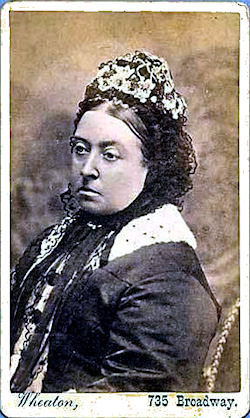Victoria (r. 1837-1901)
 Warmhearted and lively, Victoria had a gift for drawing and painting; educated by a governess at home, she was a natural diarist and kept a regular journal throughout her life. On William IV's death in 1837, she became Queen at the age of 18. Queen Victoria is associated with Britain's great age of industrial expansion, economic progress and, especially, empire. At her death, it was said, Britain had a worldwide empire on which the sun never set.
Warmhearted and lively, Victoria had a gift for drawing and painting; educated by a governess at home, she was a natural diarist and kept a regular journal throughout her life. On William IV's death in 1837, she became Queen at the age of 18. Queen Victoria is associated with Britain's great age of industrial expansion, economic progress and, especially, empire. At her death, it was said, Britain had a worldwide empire on which the sun never set.
It was during Victoria's reign that the modern idea of the constitutional monarch, whose role was to remain above political parties, began to evolve. But Victoria herself was not always non-partisan and she took the opportunity to give her opinions, sometimes very forcefully, in private. After the Second Reform Act of 1867, and the growth of the two-party (Liberal and Conservative) system, the Queen's room for maneuver decreased. Her freedom to choose which individual should occupy the premiership was increasingly restricted. In 1880, she tried, unsuccessfully, to stop William Gladstone - whom she disliked as much as she admired Disraeli and whose policies she distrusted - from becoming Prime Minister. She much preferred the Marquess of Hartington, another statesman from the Liberal party which had just won the general election. She did not get her way.
Queen Victoria was a ruler of a new type. When she ascended the throne the popular faith in kings and queens was on the decline. She revived that faith; she consolidated her throne; she not only captivated the affections of the multitude, but won the respect of thoughtful men; and all this she achieved by methods which to her predecessors would have seemed impracticable—methods which it required no less shrewdness to discover than force of character and honesty of heart to adopt steadfastly. Whilst all who approached the queen bore witness to her candor and reasonableness in relation to her ministers, she likewise proclaimed how anxiously she considered advice as was submitted to her before letting herself be persuaded that she mast accept it for the good of her people.
Though richly endowed with saving common sense, the queen was not specially remarkable for high development of specialized intellectual force. Her whole life, public and prime, was an abiding lesson in the paramount importance «of character. John Bright said of her that what specially struck him was her absolute truthfulness. The extent of her family connections, and the correspondence she maintained with foreign sovereigns, together with the confidence inspired by her personal character, often enabled her to smooth the ragged places of international relations; and she gradually became in later years the link between all parts of a democratic empire, the citizens of which felt a passionate loyalty for their venerable queen.
By her long reign and unblemished record her name had become associated inseparably with British institutions and imperial solidarity. Her own life was by choice, and as far is her position would admit, one of almost austere simplicity and homeliness; and her subjects were proud of a royalty that involved none of the mischiefs of caprice or ostentation, but set an example alike of motherly sympathy and of queenly dignity.
In the impact of a personality, it is something deeper, something fundamental and common to all its qualities, that really tells. In Victoria, it is easy to discern the nature of this underlying element: it was a peculiar sincerity. Her truthfulness, her single-mindedness, the vividness of her emotions and her unrestrained expression of them, were the varied forms which this central characteristic assumed. It was her sincerity which gave her at once her impressiveness, her charm, and her absurdity. She moved through life with the imposing certitude of one to whom concealment was impossible—either towards her surroundings or towards herself. There she was, all of her—the Queen of England, complete and obvious; the world might take her or leave her; she had nothing more to show, or to explain, or to modify; and, with her peerless carriage, she swept along her path. And not only was concealment out of the question; reticence, reserve, even dignity itself, as it sometimes seemed, might be very well dispensed with.
|
NEWSLETTER
|
| Join the GlobalSecurity.org mailing list |
|
|
|

